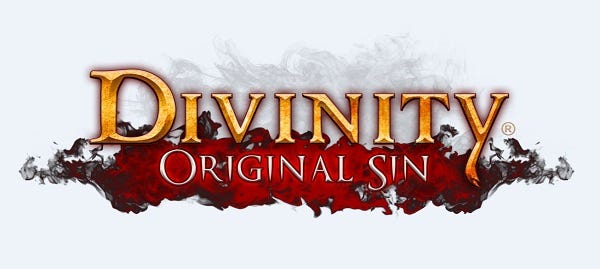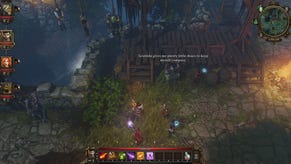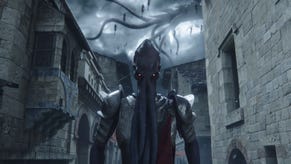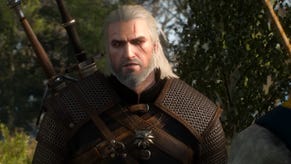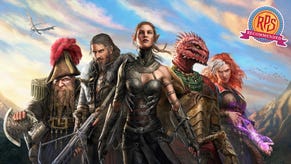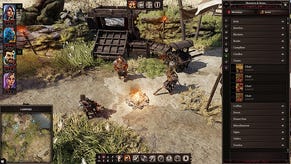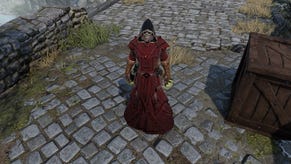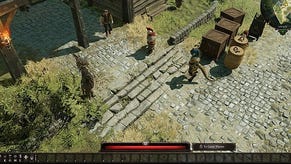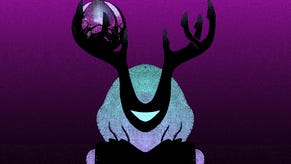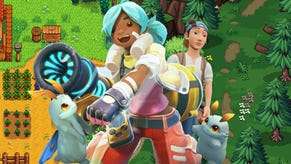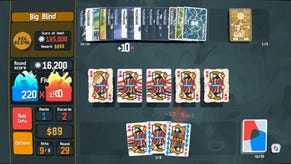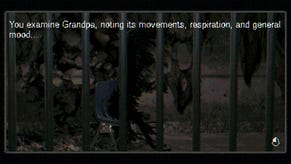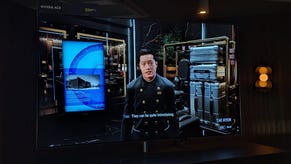Hands On: Divinity - Original Sin
Divinitiest: Divine Divsinity
"Can I steal from these market stalls?"
"Of course, but there are guards..."
"Can I lead monsters into the market and if I do will the guards attack them?"
"Of course, but..."
"Can I kill that chicken? Will the guards mind if I kill that chicken?"
I'm playing Original Sin with one of the people who is responsible for making Original Sin and I am trying to cause trouble.
(The Kickstarter campaign to raise the funds to add extra content to Divinity: Original Sin began yesterday, but I played the game a few weeks ago and have been waiting until now to tell you about it. The money that Larian are aiming to raise will go toward a second design team, to create the assets for all of the quests, dialogue, characters and areas that are still on the drawing board, so to speak. The version that I played contained enough that was good to make me hungry for more and all of my extensive thoughts are below. If you aren't familiar with the Divinity series, you may want to check the Kickstarter page before reading on.)
Playing a game with one of its creators can be distracting and even disconcerting. Often, they don't know your level of experience with the genre or their previous work, and you don't know how stable the code might be if you wander too far from the well-trodden path. Reactions are being measured, on both sides, and there's often an obligation, spoken or otherwise, to hover slightly above the mouse and keyboard, like a cagey patron in an art gallery skimming politely from exhibit to exhibit.
The nature of Original Sin's two-player mode would make it easy for the developers to treat a play session as a tour, with their character as guide and their companion as a willing subordinate, taking in the sights and the details as intended. Plenty of games don't need an actual person to act as tour manager - cutscenes, camera angles, corridors and containment are efficient shepherds and do the job exceedingly well - but while Original Sin can be played alone, the party of two naturally lends itself to co-op play and the players act as compasses and guides.
As well as fighting together - in glorious turn-based scraps that I'll describe in a later paragraph - the heroes of this tale provide ethical checks to one another. If one character begins a dialogue and the other is within earshot, he/she can chip in, contradiciting their decisions or demeanour. If the disagreement leads to altered actions or assumptions, the characters personal skills come into play and the game does some background dice-rolling to check who comes out on top. My companion wanted to bypass a battle with two hapless guards, convincing them that we were no threat. I begged to differ and stepped in with a threat and an insult. Fisticuffs ensued and the fisticuffs involved swords.
Original Sin keeps a record of each player's actions, building a sort of personality profile by measuring how trusting, honest and aggressive they are. These evolving traits colour inter-party dialogue and the whole system presents a well-worked meeting between player choice and actual roleplaying, with the flexible but developing 'role' that the term implies (as opposed to 'you have a sword and your numbers go up'). In Original Sin, you have the freedom of a fantasy world, but your choices have consequences down the line.
Those consequences are not necessarily scripted. Become more deceitful and, sure, the game may remind you with textual cues, but Larian are creating something vanishingly rare - an RPG with a world that is founded on systems rather than scripts. That's not to say there isn't a huge amount of text in the game, nor that it's uninteresting, but Original Sin encourages experimentation, in both design and play.
Thieving is a good example. There's a small market early in the game and it's possible to steal from the stalls. In fact, it's possible to steal just about anything - not since those heady nights in The Blue Boar have I been so inclined to fill my pockets with cutlery and bowls, and a new crafting system means even the smallest piece of junk might have a purpose.
If you're spotted in the act of committing a crime, the owner of the stall will react, but not always with a ready-built line of dialogue. More often than not, he'll simply follow his programming and shout for help to fetch some guards, who will then follow their programming and chase the player, who will then either fight, flee or surrender. Events cascade and it's to Larian's credit that they allowed me to saunter out of the controlled paths of the planned preview and play with what interest me most - the cogs and gears that run the machine. I want to explore the sharp edges of the world.
And that's why I ended up leading a group of monsters into the marketplace, watching the vendors flee in terror even as the guards drew their weapons and prepared to fight. I look forward to advancing my character, building a personality and gathering loot when I play the game in the discomfort of my home, but on that day I was more interested in seeing just how much Original Sin's world would stretch and engage with my efforts to play. I wasn't disappointed. Original Sin may have clever co-op conversations and a huge open world but it's also a game that has been built to be broken.
Rather than providing specific stage directions for every eventuality, Larian tag and code their world and its inhabitants, instructing every element how to react to the players' presence and actions. That's why it's not only possible to ignore the main quest and head into the wilds, it's also possible to involve NPCs in your own subplots, simply by having the systems that drive them collide and intertwine. The reactions to the situations you concoct may be less perfectly executed than a cutscene containing a motion captured and fully-voiced argument involving Ian McKellen and Patrick Stewart, but Robert Zemeckis will be bringing that to the cinema in his take on Don Quixote (Stewart is the windmill). Original Sin isn't about perfect execution, it's about a world that reacts, providing all manner of possibilities, from tactical use of artificial behaviour to accidental farce and disaster.
Combat switches the game into a turn-based mode and manages to create complex tactical decisions, bolstered by use of the elements, through both magic and the natural environment. Casting an ice spell near water will freeze the water, changing the terrain and making it more hazardous to traverse. Therefore, a spell which creates a rainstorm may only seem useful for dampening spirits and putting out fires, but can, with a little invention, transform an entire corner of the battlefield into a slippery death trap.
The early stages that were available during the time I played didn't allow for a great deal of experimentation because most abilities are unavailable at that point, but it's a promising system. Indeed, Original Sin's entire design seems to be made up of individual decisions specifically chosen to please me. Equipment drops are at least slightly believable, in that giant rats won't be wearing full platemail and carrying the deeds to a house, but items that were visible used in combat will also frequently 'break', vanishing at the moment of death. It's a good compromise, preventing those with a packrat mentality from feeling the need to carry twenty identical shortswords, but also providing a credible correlation between the thing that is killed and the things that it drops.
It's a small thing but it pleases me, as does the fact that the creatures of the world won't level alongside the player characters. Some areas are dangerous and to be avoided, and you'll either have to earn right of passage by becoming more resilient, or find an alternative way around.
When I arrived at Larian's event, I expected Dragon Commander to drown out Original Sin's more traditional noise with a barrage of hybrid genres and dragons wearing jetpacks. It's the former that has grown in my memory though. The dual character system provides an amusing and potentially dramatic back and forth (even in single player, where the second character's interruptions can be controlled or left to the computer), and the combat is solid, but it's the sheer amount of interactive elements in the world that most impressed me.
I wore a bucket on my head. I made a weapon by hammering nails into a piece of wood. I wondered how many things I'd be able to cook and craft, how many places I'd be able to camp. The answers to those questions will depend at least partly on the success of the Kickstarter, which launched yesterday. Swen Vincke, Larian's founder, understood that people may be confused as to why a game that has been in development for so long, and that is already in such a strong state, requires $400,000. The simple answer is the one on the Kickstarter page:
"We want to put together a secondary design team, backed by extra programmers, artists, animators and testers. We want to make this team as large as we can. The designers' mission will be to increase the amount of interesting things you can do in the world, as much as possible. The artists, animators, programmers and testers are needed to ensure that all the necessary assets and features to do this are present."
The content that I played was far more than a proof of concept but the nature of the game - a different kind of open world RPG that genuinely did remind me of my favourite Ultima - left me wanting more. I'd only seen a tiny portion the world, only found a couple of item recipes and less than a handful of quests, but I was hoping that the game would be enormous. It's an RPG built on solid, amusing writing and strong systems, and the more space it contains, the more possibilities there will be to explore, enjoy and break those systems.
